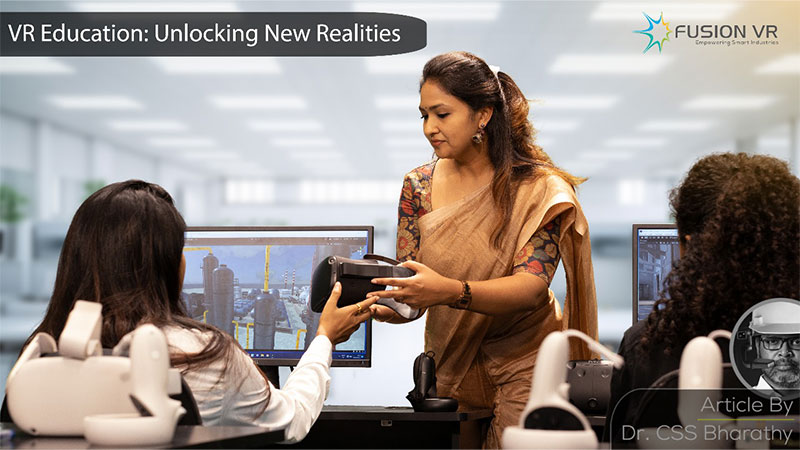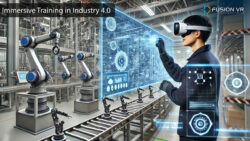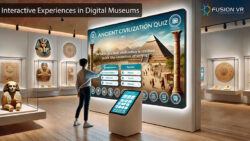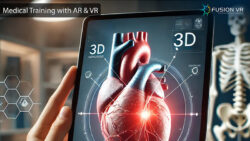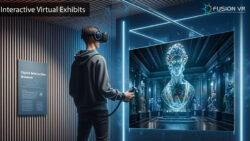Virtual Reality (VR) technology is not just an entertainment technology, but one that has serious applications across many domains. In fact, it has rapidly emerged as a transformational force across manufacturing industries of every kind. It is driving a quiet revolution and transforming the way we interact with digital content and expanding the horizons of what was once considered impossible.
Virtual reality along with Augmented Reality are important technologies in Industry 4.0 or the Fourth Industrial Revolution. The demand for VR/AR solutions is also increasing in non-technical areas such as marketing, and human resources as well in these industries. According to a recent PriceWaterhouseCoopers (PWC) report, the Virtual and Augmented reality industry has the potential to add more than 1.5 trillion dollars to the world economy by the year 2030. While the overall demand for VR applications continues to rise, the corresponding demand for highly skilled professionals is also rising. These are the people who can not only design and develop VR solutions but also deliver projects that implement these experiences. The demand growth for VR AR engineers is estimated at 1400%, with more than 23 million VR/AR jobs by the year 2030. This demand is not growing linearly, but exponentially across the globe. This is a highly dynamic field for the economy and the education sector needs to grab the opportunity presented to churn out millions of professionals with both hands.
So what are the kinds of courses that are being offered to learn virtual reality technology? With the kind of demand that I mentioned earlier, it is not hard to conceive that every imaginable kind of VR course would be offered. Considering the economic potential, it is also obvious that many players will be in the market to offer their “cutting edge” courses. The most important thing to consider is what kinds of virtual reality courses invite better opportunities for employment and drive career growth.
Today there are various types of courses to Learn Virtual Reality Technology in India and abroad.
The First on the list is degree programs that are offered at colleges and universities. These institutions offer degree courses in computer science, game design, etc where they include virtual reality technology as a course or even specialization. Such degree courses tend to provide a strong foundation along with essential knowledge in virtual reality. While this was the trend when virtual reality was introduced, it is more common to see dedicated programs being offered in virtual reality and augmented reality. Institutions have realized that such focused courses are essential to meet the job market demands.
Next on the list is specialized VR development courses that focus solely on virtual reality technology. These are courses taken by aspiring students and VR engineers early in their careers. Most of them have an engineering degree but without formal certification in virtual reality. These courses typically cover topics like VR hardware, VR solutions development, 3D modeling, and user interface and experience design for VR applications. These are courses that lead to VR certification programs that add value to individual resumes as well.
A third type of course is the integrated approach where experienced companies and leading academic institutions partner to provide the industry relevant knowledge and more importantly the cutting edge skills needed to be successful in the virtual reality industry. These courses are offered in colleges and universities as certification, specialization, major and even honors courses. The institutions define how to integrate VR design courses into their curriculum and ensure that their faculty learn virtual reality from industry experts and deliver high quality education and better placement to their students.
There are significant employment and growth opportunities for students specialized in virtual reality technology. It also is spread across a spectrum of industries considering the versatility of VR technology for learning and business applications.
The most popular area is in the Gaming and Entertainment industry, where VR first gained acceptance and popularity. This industry continues to drive the growth of virtual reality technology even today. The opportunities for college students are for becoming VR game developers, game designers, animators, programmers and engineers who are part of the team that deliver immersive experiences for their users and customers. The younger generation today is digitally and game savvy and are also naturally inclined to dig deeper in this industry.
Another area of great opportunity and interest across many industries is the use of virtual reality for educational and training purposes. Perhaps the greatest potential for virtual reality to enhance human skill and potential is here. Young professionals can aspire to become VR learning developers, VR educators, instructional designers who create immersive learning experiences that drive better understanding of concepts, create greater engagement of the learner and gain skills necessary for quicker competence in their jobs.
The healthcare industry is another area of excellent opportunity for virtual reality professionals who can develop applications for medical education, training, surgery simulations, and VR therapy. These are being increasingly adopted at hospitals and institutions worldwide and the demand for people with an aptitude for both medicine and technology is quite high.
The global engineering industry is increasingly deploying applications using VR for designing, visualizing and prototyping machinery, equipment and tools for both industrial and household use. Engineering graduates of any discipline can obtain certification in VR and find themselves in a competitive position for such jobs. The manufacturing industry is finding significant application for virtual reality simulators that train its operators and technicians to learn skills, develop and demonstrate competencies without actually being a factory or plant environment. This use case is driving the demand for such VR simulation applications as well as the demand for virtual reality engineers.
In the real estate and tourism industries, VR is a cool way to show potential customers an immersive experience of the attractions and various destinations worldwide. Developers are in demand to design applications that improve customer acquisition and close travel deals more efficiently.
Museums and Corporate Experience centers are growing across the globe. They need VR developers, artists, designers, programmers and engineers to develop unique immersive experiences that maximize visitor engagement. The growth of virtual museums is also driving the demand for VR developers. Along with this is the growth of corporate experience centers that showcase a company’s history and growth. Personnel who understand the technology and are able to operate and maintain such museums are needed.
These opportunities and applications are growing as VR technology continues to evolve and expand. We see an exponential growth trajectory for professionals in this field. Whoever can demonstrate expertise in VR development, design, and applications is most likely to be in high demand as industries continue to adopt VR technology and its solutions.
Fusion VR is at the forefront of providing immersive mixed-reality solutions to all kinds of industries. As an early mover in the VR industry, providing unique VR solutions to different consumer and industrial sectors, we are uniquely positioned to support VR demand. Furthermore, Fusion VR in partnership with ARK Infosolutions Private Limited has pioneered a unique partnership with the Industry Academic Alliance Program that is leapfrogging all efforts to rapidly develop VR training courses and enhance the manpower and VR competencies in India and gearing itself to meet the opportunities and challenges of VR adoption in India and elsewhere. We hope you are now a step further in your awareness of virtual reality technologies and the opportunities it is providing today to students and young professionals. Thank you.

